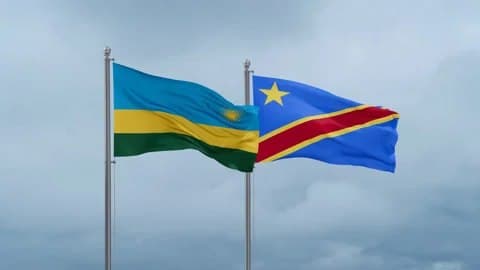DR Congo and Rwanda Launch Critical Peace Talks in Washington Amid Ongoing Clashes
In a significant development, the Democratic Republic of Congo (DRC) and Rwanda held their inaugural Joint Monitoring Committee session in Washington, D.C., aimed at advancing a peace deal established in June. The discussions come at a time of heightened tensions in the region, as clashes continue between Kigali-backed M23 rebels and pro-Kinshasa militias. Despite the intent to implement the peace agreement, key issues such as the withdrawal of M23 and the repatriation of refugees remain unresolved, casting a shadow over the talks.
Background & Context
The DRC and Rwanda share a tumultuous history marked by conflict, particularly involving the M23 rebel group, which has been accused of receiving support from the Rwandan government. The June peace deal was designed to establish a framework for dialogue and cooperation between the two nations, aiming to stabilize the eastern regions of the DRC, where violence has displaced millions. The Joint Monitoring Committee was formed as part of this agreement, tasked with overseeing the implementation of its terms and addressing ongoing security concerns.
Historically, relations between the DRC and Rwanda have been fraught with mistrust, stemming from the aftermath of the Rwandan Genocide in 1994 and the subsequent influx of refugees into the DRC. The persistent violence in eastern Congo has exacerbated these tensions, making the current peace talks vital for achieving long-term stability in the region.
Key Developments
During the Washington talks, representatives from both nations focused on the critical aspects of the peace agreement, particularly the need for M23 to withdraw from occupied territories and the process for repatriating refugees. However, reports indicate that despite the discussions, clashes continue to erupt between M23 fighters and local militias aligned with the Congolese government, undermining the potential for a peaceful resolution.
U.S. officials, who facilitated the meeting, emphasized the importance of dialogue in resolving the ongoing crisis. "Both sides need to commit to the terms of the peace deal," stated a U.S. State Department representative. "The violence must stop for any meaningful progress to occur." As previously reported, the situation in eastern Congo remains volatile, with humanitarian consequences for the local population as fighting intensifies.
Broader Impact
The implications of these talks stretch beyond the immediate conflict. Experts warn that failure to reach a sustainable agreement could lead to further instability not only in the DRC but also throughout the Great Lakes region of Africa. The continued violence poses a risk of exacerbating humanitarian crises, as displaced populations struggle for resources and safety.
Additionally, regional stability hinges on the cooperation of international stakeholders. The United Nations has been closely monitoring the situation, advocating for a unified approach to address the root causes of the conflict. Analysts have drawn parallels between this situation and other recent conflicts in the region, such as the ongoing tensions in Bosnia and Herzegovina. In light of these similar circumstances, comprehensive diplomatic efforts are essential for fostering a stable environment.
What"s Next
The next steps following the Washington talks will be crucial in determining the trajectory of peace efforts. Both the DRC and Rwanda must demonstrate a commitment to resolving outstanding issues, particularly regarding the M23 withdrawal and the repatriation of refugees. The Joint Monitoring Committee is expected to reconvene in the coming weeks, with pressure mounting from international observers to make tangible progress.
As the situation develops, the international community will be watching closely. The effectiveness of the peace talks will not only impact the DRC and Rwanda but could also set a precedent for conflict resolution in similar situations around the globe. Stakeholders are urged to remain engaged, ensuring that the dialogue continues and that humanitarian needs are addressed amid the ongoing conflict. For those interested in related coverage, the situation is reminiscent of the recent developments in Bosnia, where political tensions have also led to significant crises.


![[Video] Heavy clashes and gunfire reported in Baghdad, Iraq](/_next/image?url=%2Fapi%2Fimage%2Fthumbnails%2Fthumbnail-1768342239932-848qsh-thumbnail.jpg&w=3840&q=75)




![[Video] Gunfire between Iraqi security forces and Sadr militias in Baghdad](/_next/image?url=%2Fapi%2Fimage%2Fthumbnails%2Fthumbnail-1768343508874-4redb-thumbnail.jpg&w=3840&q=75)
